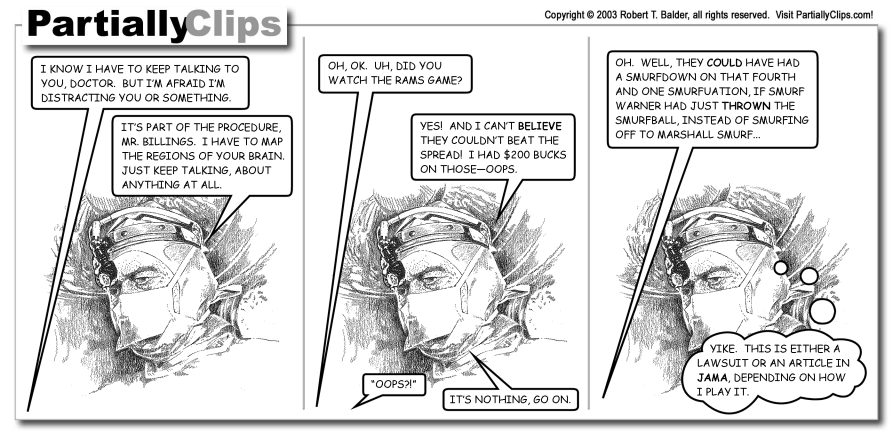A lawsuit, or an article in JAMA?
« previous post | next post »
(Click for larger version)
Mark Seidenberg, who sent the cartoon, also observed that "with TMS you can induce this kind of thing in normals", as for example illustrated in Gorana Pobric et al., "Anterior temporal lobes mediate semantic representation: Mimicking semantic dementia by using rTMS in normal participants", PNAS 104(50): 20137-20141, 2007:
Studies of semantic dementia and PET neuroimaging investigations suggest that the anterior temporal lobes (ATL) are a critical substrate for semantic representation. In stark contrast, classical neurological models of comprehension do not include ATL, and likewise functional MRI studies often fail to show activations in the ATL, reinforcing the classical view. Using a novel application of low-frequency, repetitive transcranial magnetic stimulation (rTMS) over the ATL, we demonstrate that the behavioral pattern of semantic dementia can be mirrored in neurologically intact participants: Specifically, we show that temporary disruption to neural processing in the ATL produces a selective semantic impairment leading to significant slowing in both picture naming and word comprehension but not to other equally demanding, nonsemantic cognitive tasks.
I blogged this cartoon back in 2003 ("Brain & Language, the Cartoon Version", 1/22/2003), but without the helpful link to instructions for trying the same thing at home. (No, please, don't! In the hands of trained medical professionals, rTMS is more or less safe, but despite the fact that there's actually a site http://open-rtms.sourceforge.com, I recommend strongly against experimenting with self-induced aphasia. Anyhow, the Pobric et al. experiments didn't create any fun paraphasias, just slowed reaction times for picture-naming and synonym-finding tasks — which is exactly how I feel here in France, without the trouble or expense of subjecting my anterior temporal lobes to high-intensity pulsed magnetic fields.)

Mark P said,
June 26, 2008 @ 12:31 pm
"Oops." Very close to the top of the list of words you do not want to hear in the operating room.
rpsms said,
June 26, 2008 @ 1:09 pm
I was having a simple procedure done years ago, and the nurse dropped something (metalic) on the floor and said "oops."
The doctor said "never say oops when working with a patient." IIRC he said to clear your throat instead.
The moral of the story: "if your doctor seems to have something in his throat, run"
Clumpy said,
June 26, 2008 @ 8:07 pm
That's pretty foolproof, rpsms; in such a case your doctor has either made a mistake or is plagued with an infectious cold. Either way, get out of there.
Jean-Sébastien Girard said,
June 26, 2008 @ 9:20 pm
Very close after "oops" is "eeeww".
Chris said,
June 27, 2008 @ 11:04 am
I'm I the only one who can't get "Yike" (without the "s")?
Bob O'H said,
June 29, 2008 @ 1:39 am
(WARNING: British cultural reference)
"with TMS you can induce this kind of thing in normals"
True, but it usually ends up in discussions of the leg side lbw law, and chocolate cake.